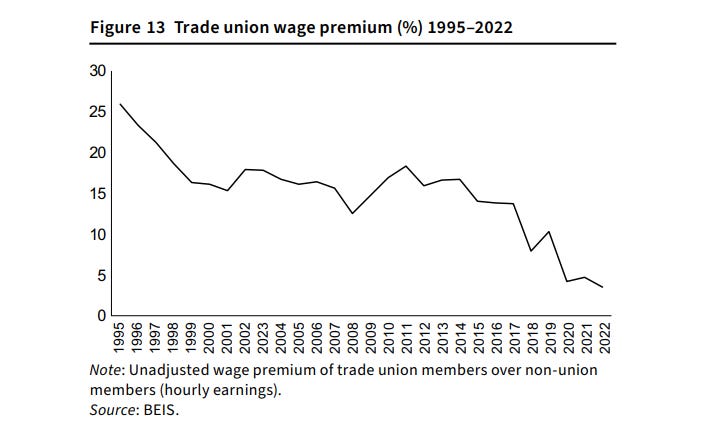By Prof Len Shackleton
Increasing union power could burden taxpayers with higher public sector wage bills and more disruption to railways, schools and the NHS.
Union membership has declined from over half of workers in 1979 to less than a quarter today.
Union membership is heavily concentrated in the public sector, where 49% of workers are unionists compared to 12% in the private sector.
Most research studies suggest that UK unions have a net negative impact on productivity, and that unionised businesses grow more slowly than non-unionised firms.
Giving unions special legal privileges, such as immunity from civil action for striking, causes additional societal damage, as seen during the 1940s and 1980s.
The government’s plans to relax strike restrictions will give public sector unions more power to extract benefits for their members at the expense of taxpayers, employers and fellow workers.
The new government has already agreed to inflation-busting pay rises for public sector workers and has pledged to strengthen trade unions through legislation. But according to a new book from the free market think tank, the Institute of Economic Affairs, more government protections for unions would allow them ‘to extort higher pay from the government, which ultimately means the taxpayer.’
‘It is difficult to offer a defensible rationale for such a power in modern conditions in a democratic country’, argues book author and IEA Editorial and Research Fellow Professor Len Shackleton.
Professor Shackleton argues that ‘if we are to see a reversion to regular and prolonged strike activity in key parts of the public sector, it seems likely that sooner or later responsible governments of any political persuasion will have to take action to restrict or abolish this power.’
‘Governments of the past learnt the hard way that unfettered union power threatened their objectives for economic and social reform. By its supportive attitude to unions, today’s government risks having to learn this lesson all over again.’
Shackleton proposes several measures which might be used to tackle public sector union power:
Reform centralised Pay Review Bodies to allow for more flexible dispute resolution, including linking pay to individual performance.
Negotiate voluntary no-strike agreements in critical public services.
Consider the reintroduction of compulsory arbitration for prolonged disputes.
Impose strike bans in some key areas of public services, as is done in a range of democratic countries such as Germany, Denmark, Poland and the United States.
Unions Resurgent? The Past, Present and Uncertain Future of Trade Unions in Britain examines the history of UK trade unionism, analysing its economic effects and considering its future role. It argues that while unions can provide benefits to members, their overall economic impact is often negative, particularly in terms of productivity and employment growth. Legal protections for unions often result in higher wages for their members, but these gains come at a cost to consumers, non-unionised workers and taxpayers.
Since 1906, strike activity has been immune from civil action for damages to employers or customers. That immunity remains a ‘key element of union power,’ according to Shackleton. Unions have always been subject to some restrictions. However, the government proposes to loosen those restrictions and make it easier to strike.
Union membership today is disproportionately concentrated in the public sector, with 49% of public sector workers being union members compared to just 12% in the private sector. Even so, most unionised workers in the private sector are in ex-public sector industries, such as Royal Mail or utilities.
Shackleton does not argue that unions are inherently a pernicious force. He explains that unions can obtain benefits for their members without coercion and excessive legal privilege. They continue to offer members a range of ‘friendly society’ benefits, while offering vital support with grievances, disciplinary cases and employment tribunals.
‘In a free society, the right to set up or join independent trade unions…is a fundamental and, from a liberal perspective, non-negotiable right’, Shackleton argues, ‘At their best, unions can be a force for good’.
But many of today’s trade unions are a far cry from that ideal. Unions in government-dominated sectors such as healthcare and transport have harnessed privileges to gain higher pay at the expense of taxpayers, while resisting reforms and improvements in productivity.
Rather than strengthening those privileges, Shackleton argues, the government may have to consider further limiting public sector strikes if economic damage and disruption continue.
Len Shackleton, book author, IEA Editorial and Research Fellow, and Professor of Economics at the University of Buckingham, said:
“Many of today’s politicians have forgotten the lessons of the 1960s, 70s and 80s. In protecting their members and promoting their interests, trade unions do an important job. But when this involves disrupting and damaging wider public interests, governments need to ensure that there are clear boundaries set. The government should think very carefully before making it easier for unions to take industrial action.”
Read a full copy of Unions Resurgent? The Past, Present and Uncertain Future of Trade Unions in Britain.
Trade union wage premium (%) 1995–2022
Trade union density (%) Great Britain 1980–2020
Trade union density, selected countries 2000–19 (or latest available date)
Unions have historically been male-dominated but in 2022, union density among female employees was 25.6%, as against 19.1% for males.
In 1995 6.4% of employees aged 16–19 were in unions, but by 2022 this had fallen to 2.4%. The corresponding figures for 20–24-year-olds were 19.3% and 8.9% respectively.
Union members are now more likely (54.3%) to have a degree or equivalent than non-union members (42.2%). They are much more likely (43.5% to 24.5%) to be in a professional occupation than non-unionists.
About the Author
Len Shackleton is Professor of Economics at the University of Buckingham and Research and Editorial Fellow at the Institute of Economic Affairs. He edits the journal Economic Affairs.






